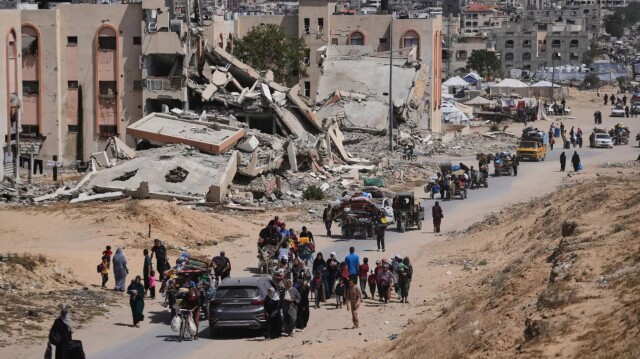On Friday, the Israeli government issued a stark warning to the Palestinian IslamistHamas, stating that it must either accept the US ceasefire proposal and release hostages taken since the October 7, 2023, attack, or face complete eradication. In response, US President Donald Trump claimed a ceasefire is “very close.”
Israel is experiencing increasing international pressure over its ongoing war in the Gaza Strip, where a blockade has led to severe shortages of food, medical supplies, and other essentials for over two months, despite a partial easing last week.
Earlier this month, Israel intensified its military actions, aiming to rescue remaining hostages, assert control over the Palestinian enclave, and eliminate Hamas, which has governed the area since 2007.
Israeli Defense Minister Israel Katz stated last night that the military operations are continuing “with full force” while ensuring local civilians are relocated from conflict zones. He warned Hamas, saying, “The murderers must now choose: accept the ‘Whitcoff agreement’ for hostage release or face annihilation,” referring to the proposal from US special envoy Steve Whitcoff.
During a press briefing, Trump echoed that “they are very close to an agreement on Gaza.”
According to Jens Lerke, of the UN Office for the Coordination of Humanitarian Affairs (OCHA), the Gaza Strip is “the most malnourished area in the world,” with a population at a high risk of starvation.
In related news, Stefan Dujarik, spokesperson for the UN Secretary-General, reported that a group of armed individuals raided hospitals in Deir al-Bala, stealing vital medical supplies intended for malnourished children.
Despite ongoing indirect negotiations aimed at achieving a ceasefire to conclude a war lasting over 20 months, there has been little progress since Israel resumed its military offensive in mid-March, following a two-month truce.
The day before, White House spokeswoman Caroline Levitt mentioned that a new US ceasefire proposal had been accepted by Israel and presented to Hamas.
However, Bassem Naim, a leader of Hamas in exile, stated that the proposal fails to meet their basic demands, viewing it as “a continuation of occupation, killings, and starvation.”
A source within Hamas mentioned a lack of guarantees for ongoing negotiations during any potential ceasefire aimed at ending the war.
Hamas claimed it is currently engaging in “consultations with Palestinian forces and factions” about the proposal “put forward by Mr. Whitcoff through mediators.”
In response, Israeli National Security Minister Itamar Ben-Gvir, who has taken a hardline stance since the conflict began, urged Prime Minister Netanyahu’s government to utilize “all necessary force” to eliminate Hamas.
On the ground, civil defense officials in Gaza reported that Israeli airstrikes led to the deaths of 45 individuals on Friday across various regions of the enclave.
The initial assault by Hamas on southern Israel on October 7, 2023, which sparked the current conflict, resulted in 1,218 fatalities on the Israeli side, primarily civilians, according to French news agency estimates. Of the 251 people abducted that day, 57 remain in Gaza, and at least 34 are confirmed dead, as per Israeli sources. Additionally, Hamas retains possession of the body of an Israeli soldier killed in a previous conflict in the enclave in 2014.
Since then, over 54,321 Palestinians, predominantly civilians, have lost their lives due to extensive Israeli military operations, with these figures deemed credible by the United Nations.
In conjunction with military actions in Gaza, Israel has also accelerated the expansion of settlements in the West Bank.
Following Israel’s announcement of 22 new Jewish settlements in the occupied West Bank, Egypt condemned this as a “flagrant violation of international law and Palestinian rights.”
Egypt also asserted that “Israeli settlements obstruct the achievement of a two-state solution and a just, lasting peace.” The 57 member states of the Organization of Islamic Cooperation (OIC), which includes Egypt, also expressed condemnation of Israel’s actions.
In a significant diplomatic development, Saudi Arabia’s foreign minister is scheduled to visit Ramallah in the West Bank on Sunday, marking the highest-level visit to Palestinian territories since 1967.
However, Israeli Channel 12 reported that Israeli authorities are not planning to facilitate this visit, nor those of other Arab diplomatic leaders, including from Jordan, Egypt, and the UAE.
As of now, neither the Israeli government nor the relevant Arab states have responded to these reports.
Ask me anything
Explore related questions

















